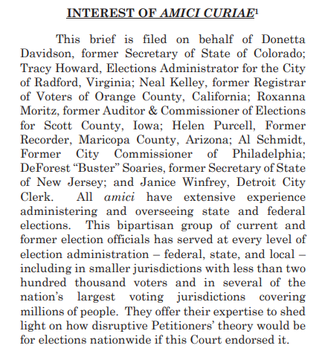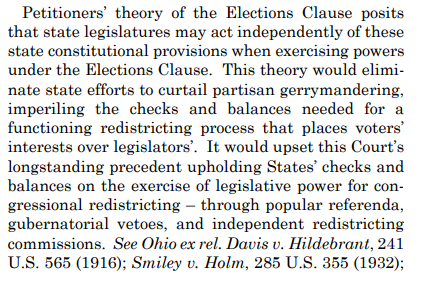
The amicus briefs in the SCOTUS fight vs. the independent state legislature theory—Moore v. Harper—are now all IN. Together, they make a strong cross-partisan case against the ISLT that highlights big problems with Petitioners' presentation. Let's go! 🧵👇@BrennanCenter
The takeaways:
1. Opposition to the ISLT is bipartisan
2. The anti-ISLT camp is big and diverse, the pro-ISLT camp... isn’t
3. The weight of authority is anti-ISLT
4. The ISLT threatens major harms, which Petitioners ask the Court to ignore @BrennanCenter #ISLTamici
1. Opposition to the ISLT is bipartisan
2. The anti-ISLT camp is big and diverse, the pro-ISLT camp... isn’t
3. The weight of authority is anti-ISLT
4. The ISLT threatens major harms, which Petitioners ask the Court to ignore @BrennanCenter #ISLTamici
(“Petitioners” = the gerrymanderers from the North Carolina legislature who are asking SCOTUS to reinstate that state’s heavily gerrymandered congressional map by endorsing the ISLT.)
For those just joining me, I’m a legal strategist and appellate attorney @BrennanCenter. My goal here is to sift through thousands of pages of sometimes very technical material and pull out the major themes. And, with that, let’s dig in...
First #ISLTamici Theme: Opposition to the ISLT is bipartisan
Opposition to the ISLT isn’t a red or blue thing. In fact, DOZENS of prominent conservative figures have come out against it in a mix of briefs from conservative and bipartisan filers. They include:
1. Highly respected former D.C. Cir. Judge Thomas Griffith & 16 others who have been Republican electeds, worked in Republican administrations, or "support conservative federal judicial principles." They write: 

2. Leading Republican election lawyer Ben Ginsberg, who was on the Republican side of the case that brought us the seeds of the ISLT, Bush v. Gore. He writes: 

3. A co-founder of the Federalist Society, Steven Calabresi, who filed with Akhil and Vikram Amar. They write: 

4. A bipartisan who’s who of current and former election officials from every level of state government. The roster and what they write: 



7. Former Republican Governor of California Arnold Schwarzenegger (whose brief is already making waves). He writes: 

This big cast of conservative filers—which spans high-ranking federal and state government officials, attorneys, et al—is joining the anti-ISLT fight along w/ noted conservative jurist @judgeluttig, who is now serving as party counsel for voters and non-profits.
They also join the Conference of Chief Justices, a group that represents the chief justices of all 50 states. The CCJ earlier condemned the ISLT in a brief it filed in support of neither party.
More details on that filing:
More details on that filing:
https://twitter.com/tomTMwolf/status/1567302276435378182?s=20&t=iQFH4SW_flhzaH0Ta7QAoA
And conservative legal scholar Derek Muller has shown the Court one way to resolve this case in favor of voters without dipping into the controversy around the ISLT 

(My colleague Helen White @hebwhite at Protect Democracy has more on these filers today @JustSecurity: justsecurity.org/83831/as-moore…)
Thread continues here, with the second theme:
https://twitter.com/tomTMwolf/status/1586104237641019392?s=20&t=8N9hfkMOH9QJOvrIBCJ-ZA
• • •
Missing some Tweet in this thread? You can try to
force a refresh







